
CSGHub
CSGHub is an opensource large model assets platform just like on-premise huggingface which helps to manage datasets, model files, codes and more. CSGHub是一个开源、可信的大模型资产管理平台,可帮助用户治理LLM和LLM应用生命周期中涉及到的资产(数据集、模型文件、代码等)。CSGHub提供类似私有化的Huggingface功能,以类似OpenStack Glance管理虚拟机镜像、Harbor管理容器镜像以及Sonatype Nexus管理制品的方式,实现对LLM资产的管理。欢迎关注反馈和Star⭐️
Stars: 2768

CSGHub is an open source, trustworthy large model asset management platform that can assist users in governing the assets involved in the lifecycle of LLM and LLM applications (datasets, model files, codes, etc). With CSGHub, users can perform operations on LLM assets, including uploading, downloading, storing, verifying, and distributing, through Web interface, Git command line, or natural language Chatbot. Meanwhile, the platform provides microservice submodules and standardized OpenAPIs, which could be easily integrated with users' own systems. CSGHub is committed to bringing users an asset management platform that is natively designed for large models and can be deployed On-Premise for fully offline operation. CSGHub offers functionalities similar to a privatized Huggingface(on-premise Huggingface), managing LLM assets in a manner akin to how OpenStack Glance manages virtual machine images, Harbor manages container images, and Sonatype Nexus manages artifacts.
README:
[!WARNING] CSGHub Portal has migrated the web framework from Rails to Gin. If you're using our Rails version before, you may need to refer to our new documents migrate to Gin to see how to migrate to Gin version.
CSGHub is an open source, trustworthy large model asset management platform that can assist users in governing the assets involved in the lifecycle of LLM and LLM applications (datasets, model files, codes, etc).
With CSGHub, users can perform operations on LLM assets, including uploading, downloading, storing, verifying, and distributing, through Web interface, Git command line, or natural language Chatbot. Meanwhile, the platform provides microservice submodules and standardized OpenAPIs, which could be easily integrated with users' own systems.
CSGHub is committed to bringing users an asset management platform that is natively designed for large models and can be deployed On-Premise for fully offline operation. CSGHub offers functionalities similar to a privatized Huggingface(on-premise Huggingface), managing LLM assets in a manner akin to how OpenStack Glance manages virtual machine images, Harbor manages container images, and Sonatype Nexus manages artifacts.
You can try the free SaaS version of CSGHub through the OpenCSG Community official website.https://opencsg.com/models
You can also jump to the Quick Start section to quickly launch your local instance and explore all the features of CSGHub.

- [2024.09.15] v0.9.0 CSGHub portal been migrated to the Go version, git server support Gitaly and use it as default, collections function been added, new resource console page, running space endpoint finetune do not need domain anymore other UX optimization and bug fix.
- [2024.08.15] v0.8.0 Big release to introduce a standalone
user_serverservice and move user, org, token management fromCSGHubto backend serverCSGHub-server, introduce a standalonestarhub_server_runner servicefor uniformed deployment of Application Space, Mode Inference and Finetune. Resource management enchanced, multiple k8s clusters in different regions are not supported. - [2024.07.15] v0.7.0 Big release to support
Multiple Resource Syncfor models and datasets, One-Click Fintune, Resource Usage Metering. - [2024.06.21] v0.6.1 bug fix and user experience enhancement.
- [2024.06.18] v0.6.0 Big release to support
dedicatedmodel inference endpoint, supportstreamlitSpace, allow use tolikerepos allow to set repo'sindustry tag, enhance git history and commit diff details. - [2024.05.14] v0.5.0 Enhance Space user experience, auto build
relationsbetween repos(model,dataset,code and spaces), support multiple files uploading. - [2024.04.18] v0.4.0 Allow to run
Application Space(gradio app), add a widget to try model inference, support new repo typeCode, support organization members management, support wechat login. - [2024.03.15] v0.3.0 Plan: Files online editing, organization edit, dataset preview.
- [2024.02.15] v0.2.0 Improve the function of model dataset hosting, and add the feature of inviting new organization members.
- [2024.01.15] v0.1.0 CSGHub Alpha version release, supports model and dataset management functions, detailed function is as below.
In the era of LLM, data and models are increasingly becoming the most important digital assets for businesses and individual users. However, there are currently issues such as fragmented management tools, limited management methods, and localization, which not only pose potential threats to secure operations but also might hinder the updating and iteration of enterprise-scale models. If you believe that large models will become a major driving force in the upcoming revolution, you may also be considering how to manage core assets — models, data, and large model application code — more efficiently and securely. CSGHub is an open-source project designed to address these issues.
CSGHub's core funtions(update reguarly):
- Unified Management of LLM Assets: A one-stop Hub for unified management of model files, datasets, and large-scale model application codes.
- Development Ecosystem Compatibility: Supports both HTTPS and SSH protocols for Git commands and web interface operations, ensuring convenient usage for different users.
- Large Model Capability Expansion: Natively supports version management, model format conversion, automatic data processing, and dataset preview functions.
- Permissions and Security: Supports integration with corporate user systems, setting of asset visibility, and zero-trust authentication interface design for both external and internal users, maximizing security.
- Support for Private Deployment: Independent of internet and cloud vendors, enabling one-click initiation of private deployment.
- Native Design for Large Models: Supports natural language interaction, one-click model deployment, and asset management for Agent and Copilot App.
The technical design of CSGHub are as follows:
- CSGHub integrates multiple technologies including Git Servers, Git LFS (Large File Storage) protocol, and Object Storage Service (OSS), providing a reliable data storage layer, a flexible infrastructure access layer, and extensive support for development tools.
- Utilizing a service-oriented architecture, CSGHub offers backend services through CSGHub Server and a management interface via CSGHub Web Service. Ordinary users can quickly initiate services using Docker compose or Kubernetes Helm Chart for enterprise-level asset management. Users with in-house development capabilities can utilize CSGHub Server for secondary development to integrate management functions into external systems or to customize advanced features.
- Leveraging outstanding open-source projects like Apache Arrow and DuckDB, CSGHub supports previewing of Parquet data file formats, facilitating localized dataset management for researchers and common users.
- CSGHub provides an intuitive web interface and permission design for enterprise organization structure. Users can realize version control management, online browsing and downloading through the web UI, as well as set the visibility scope of datasets and model files to realize data security isolation, and can also initiate topic discussions on models and datasets.
Our R&D team has been focusing on AI + DevOps for a long time, and we hope to solve the pain points in the development process of large models through the CSGHub project. We encourage everyone to contribute high-quality development and operation and maintenance documents, and work together to improve the platform, so that large models assets can be more traceable and efficient.
In order to help users to quickly understand the features and usage of CSGHub, we have recorded a demo video. You can watch this video to get a quick understanding of the main features and operation procedures of this program.
-
Asset Management
- [x] Built-in Code Repo: Built-in Code Repo management function to associate the code of model, dataset, Space space application.
- [x] Multi-source data synchronization: Support configure and enable remote repository, automatic data synchronization, support OpenCSG community, Huggingface and other remote sources。
-
AI Enhancement
- [x] One-Click Fine-Tuning: Support integration with OpenCSG llm-finetune tool to start model fine-tuning training with one click.
- [x] One-Click Inference: Support integration with OpenCSG llm-inference tool to start model reasoning service with one click.
-
LLM App and Enterprise Features
- [x] App Space: Support hosting Gradio/Streamlit applications and publishing them to App Space.
- [x] Fine-grained Permission Control: Fine-grained permission and access control settings for enterprise architecture.
-
Security Compliance
- [ ] GitServer Adapter: Generic GitServer adapter to support multiple major Git repository types through Adaptor mode.
- [x] Asset Metadata: Asset metadata management mechanism, supporting customized metadata types and corresponding AutoTag rules.
The detailed roadmap is designed as follows: full roadmap
CSGHub is made with two typical parts: Portal and Server. This repo corresponds to CSGHub Portal, while CSGHub Server is another high-performance backend project implemented with Golang.
If you want to dive deep into CSGHub Server detail or wish to integrate the Server with your own frontend system or more, you can check the CSGHub Server open-source project.
You can refer to herequickly deploy a basic csghub instance.
We welcome developers of all levels to contribute to our open-source project, CSGHub. If you would like to get involved, please refer to our contributing guidelines. We look forward to your participation and suggestions.
This project is based on Rails, Vue3, Tailwind CSS, Administrate, Postgresql, Apache Arrow, DuckDB and GoGin, whose open source contributions are deeply appreciated!
If you meet any problem during usage, you can contact with us by any following way:
- initiate an issue in github
- join our WeChat group by scaning wechat helper qrcode
- join our official discord channel: OpenCSG Discord Channel
- join our slack workspace:OpenCSG Slack Channel
For Tasks:
Click tags to check more tools for each tasksFor Jobs:
Alternative AI tools for CSGHub
Similar Open Source Tools

CSGHub
CSGHub is an open source, trustworthy large model asset management platform that can assist users in governing the assets involved in the lifecycle of LLM and LLM applications (datasets, model files, codes, etc). With CSGHub, users can perform operations on LLM assets, including uploading, downloading, storing, verifying, and distributing, through Web interface, Git command line, or natural language Chatbot. Meanwhile, the platform provides microservice submodules and standardized OpenAPIs, which could be easily integrated with users' own systems. CSGHub is committed to bringing users an asset management platform that is natively designed for large models and can be deployed On-Premise for fully offline operation. CSGHub offers functionalities similar to a privatized Huggingface(on-premise Huggingface), managing LLM assets in a manner akin to how OpenStack Glance manages virtual machine images, Harbor manages container images, and Sonatype Nexus manages artifacts.
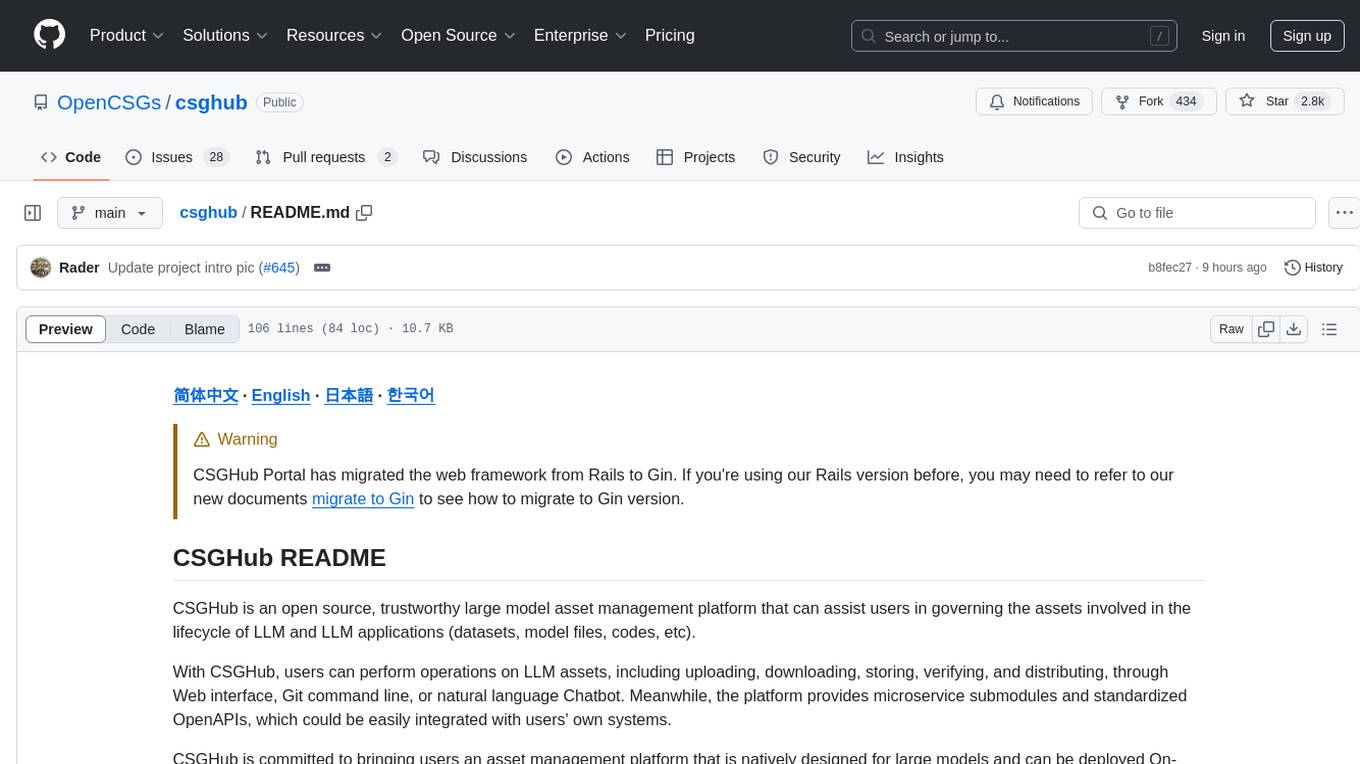
csghub
CSGHub is an open source platform for managing large model assets, including datasets, model files, and codes. It offers functionalities similar to a privatized Huggingface, managing assets in a manner akin to how OpenStack Glance manages virtual machine images. Users can perform operations such as uploading, downloading, storing, verifying, and distributing assets through various interfaces. The platform provides microservice submodules and standardized OpenAPIs for easy integration with users' systems. CSGHub is designed for large models and can be deployed On-Premise for offline operation.

coze-studio
Coze Studio is an all-in-one AI agent development tool that offers the most convenient AI agent development environment, from development to deployment. It provides core technologies for AI agent development, complete app templates, and build frameworks. Coze Studio aims to simplify creating, debugging, and deploying AI agents through visual design and build tools, enabling powerful AI app development and customized business logic. The tool is developed using Golang for the backend, React + TypeScript for the frontend, and follows microservices architecture based on domain-driven design principles.
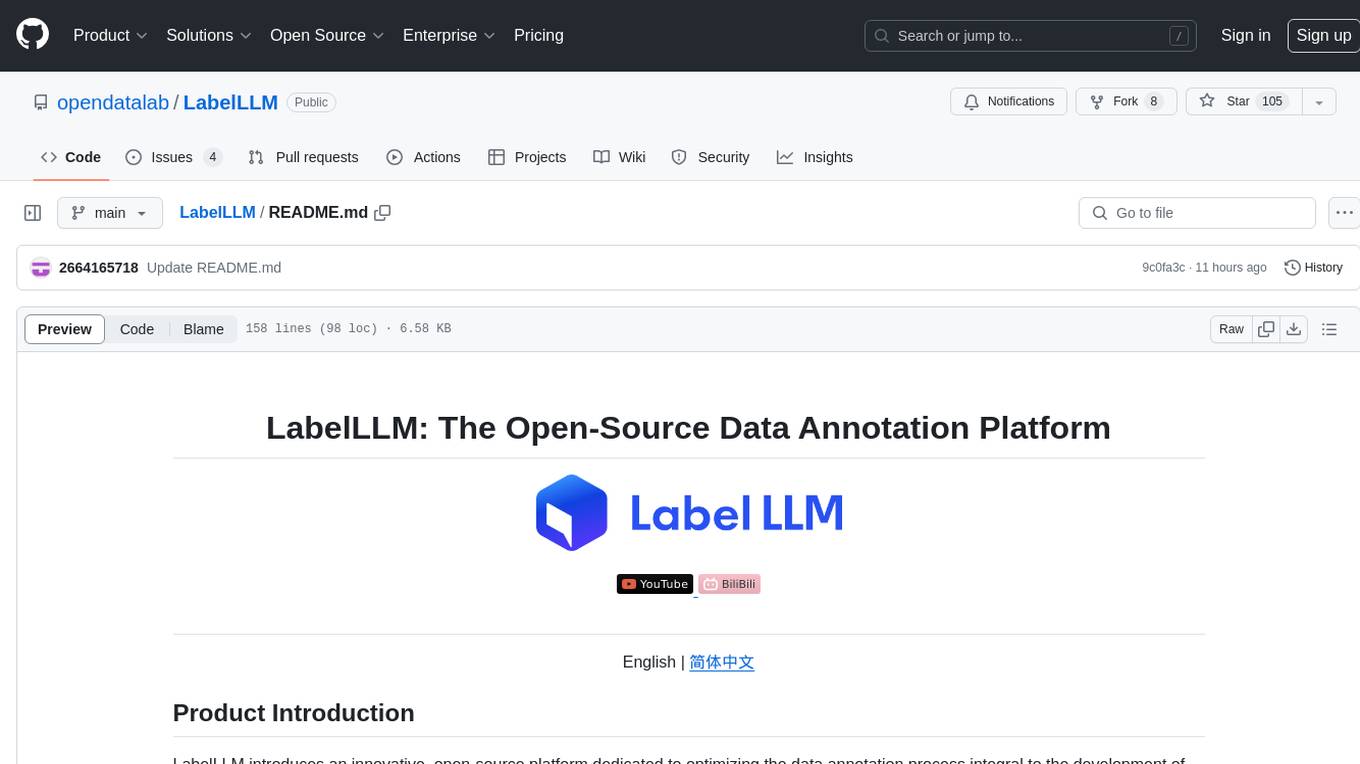
LabelLLM
LabelLLM is an open-source data annotation platform designed to optimize the data annotation process for LLM development. It offers flexible configuration, multimodal data support, comprehensive task management, and AI-assisted annotation. Users can access a suite of annotation tools, enjoy a user-friendly experience, and enhance efficiency. The platform allows real-time monitoring of annotation progress and quality control, ensuring data integrity and timeliness.

AgentUp
AgentUp is an active development tool that provides a developer-first agent framework for creating AI agents with enterprise-grade infrastructure. It allows developers to define agents with configuration, ensuring consistent behavior across environments. The tool offers secure design, configuration-driven architecture, extensible ecosystem for customizations, agent-to-agent discovery, asynchronous task architecture, deterministic routing, and MCP support. It supports multiple agent types like reactive agents and iterative agents, making it suitable for chatbots, interactive applications, research tasks, and more. AgentUp is built by experienced engineers from top tech companies and is designed to make AI agents production-ready, secure, and reliable.
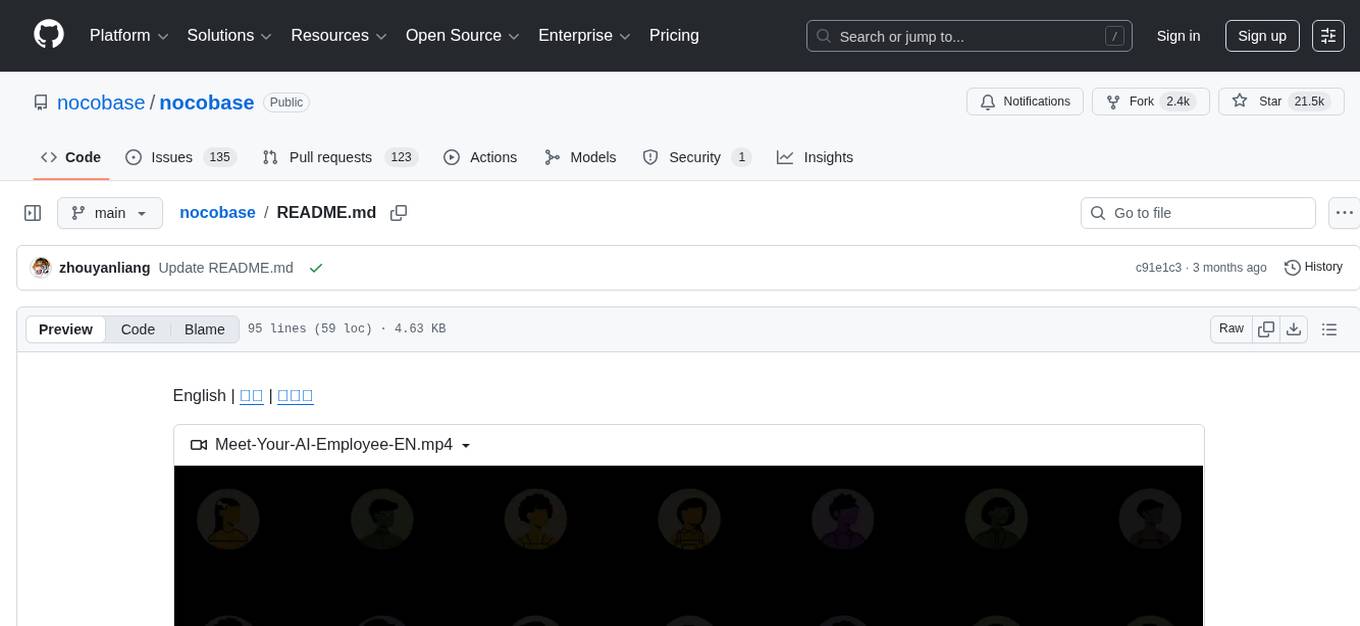
nocobase
NocoBase is an extensible AI-powered no-code platform that offers total control, infinite extensibility, and AI collaboration. It enables teams to adapt quickly and reduce costs without the need for years of development or wasted resources. With NocoBase, users can deploy the platform in minutes and have complete control over their projects. The platform is data model-driven, allowing for unlimited possibilities by decoupling UI and data structure. It integrates AI capabilities seamlessly into business systems, enabling roles such as translator, analyst, researcher, or assistant. NocoBase provides a simple and intuitive user experience with a 'what you see is what you get' approach. It is designed for extension through its plugin-based architecture, allowing users to customize and extend functionalities easily.

CodeFuse-muAgent
CodeFuse-muAgent is a Multi-Agent framework designed to streamline Standard Operating Procedure (SOP) orchestration for agents. It integrates toolkits, code libraries, knowledge bases, and sandbox environments for rapid construction of complex Multi-Agent interactive applications. The framework enables efficient execution and handling of multi-layered and multi-dimensional tasks.
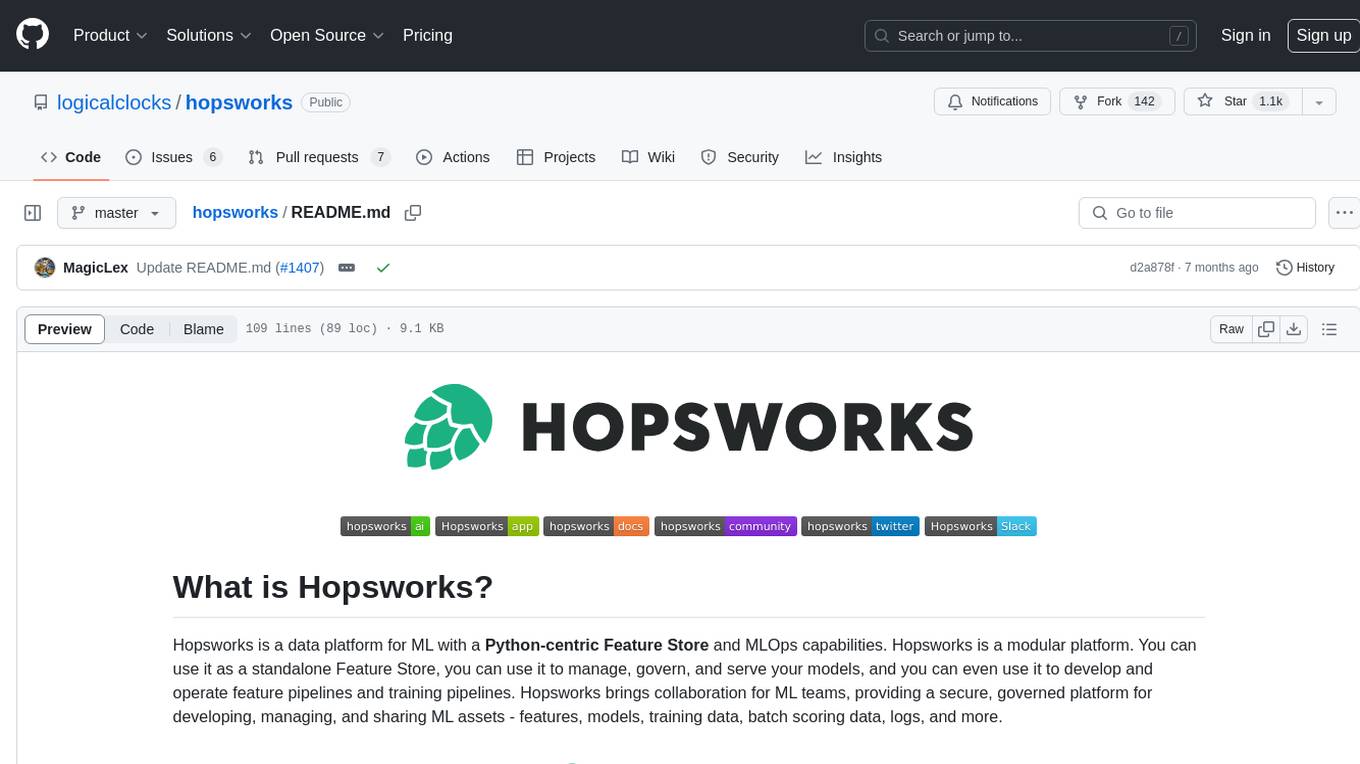
hopsworks
Hopsworks is a data platform for ML with a Python-centric Feature Store and MLOps capabilities. It provides collaboration for ML teams, offering a secure, governed platform for developing, managing, and sharing ML assets. Hopsworks supports project-based multi-tenancy, team collaboration, development tools for Data Science, and is available on any platform including managed cloud services and on-premise installations. The platform enables end-to-end responsibility from raw data to managed features and models, supports versioning, lineage, and provenance, and facilitates the complete MLOps life cycle.
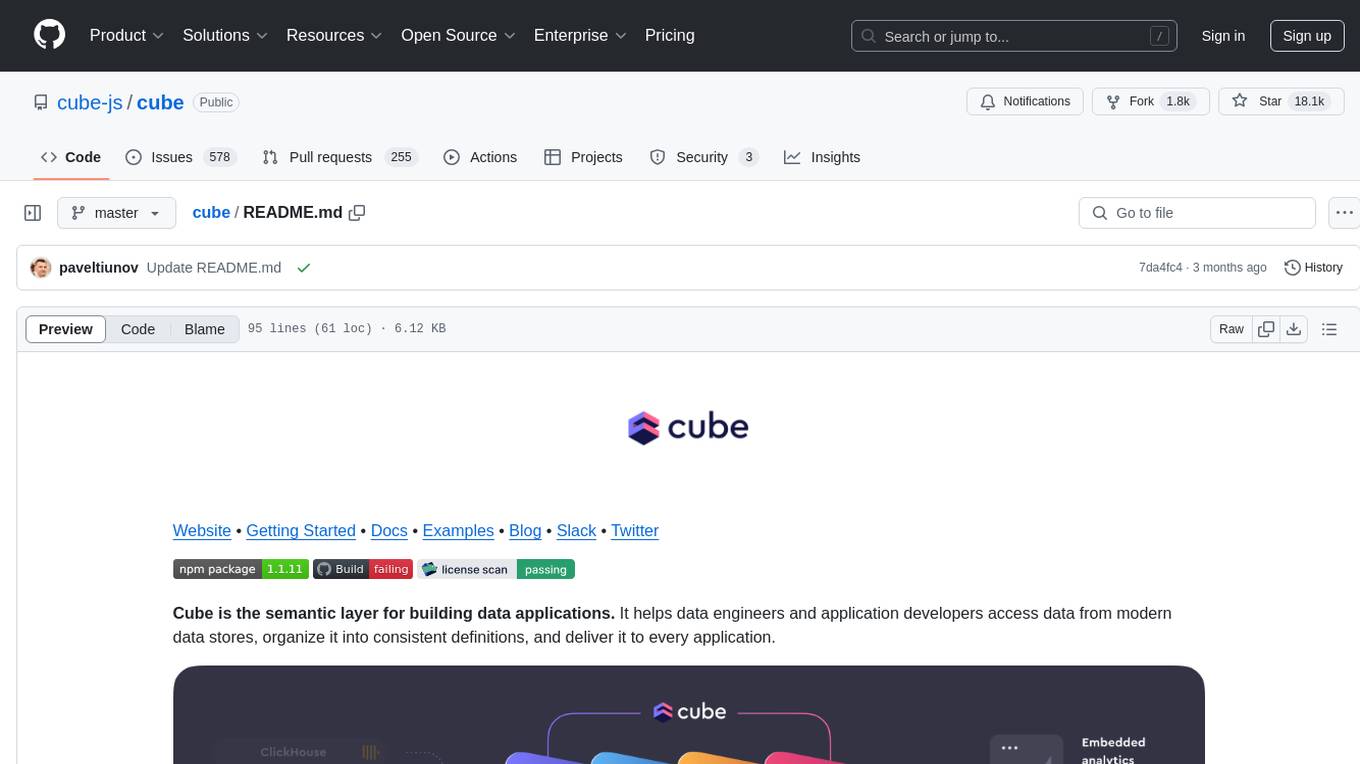
cube
Cube is a semantic layer for building data applications, helping data engineers and application developers access data from modern data stores, organize it into consistent definitions, and deliver it to every application. It works with SQL-enabled data sources, providing sub-second latency and high concurrency for API requests. Cube addresses SQL code organization, performance, and access control issues in data applications, enabling efficient data modeling, access control, and performance optimizations for various tools like embedded analytics, dashboarding, reporting, and data notebooks.
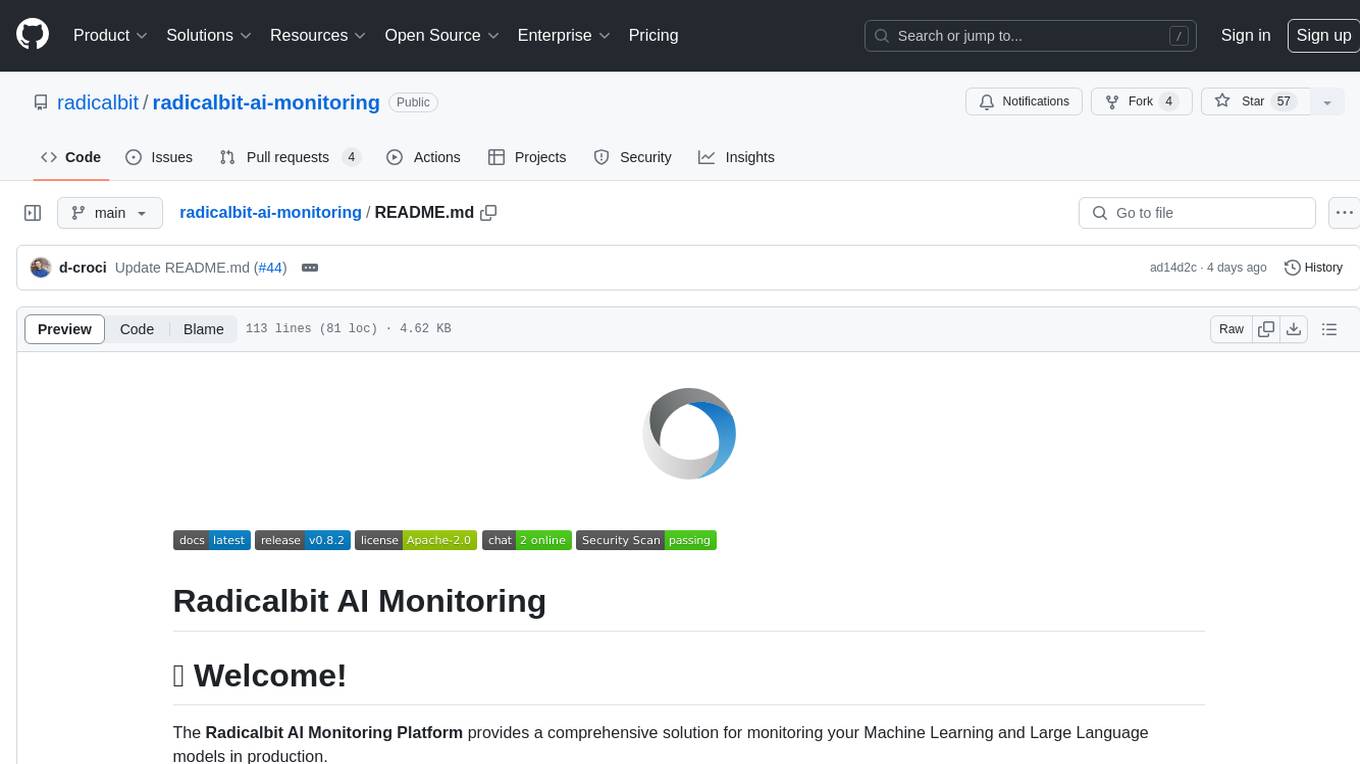
radicalbit-ai-monitoring
The Radicalbit AI Monitoring Platform provides a comprehensive solution for monitoring Machine Learning and Large Language models in production. It helps proactively identify and address potential performance issues by analyzing data quality, model quality, and model drift. The repository contains files and projects for running the platform, including UI, API, SDK, and Spark components. Installation using Docker compose is provided, allowing deployment with a K3s cluster and interaction with a k9s container. The platform documentation includes a step-by-step guide for installation and creating dashboards. Community engagement is encouraged through a Discord server. The roadmap includes adding functionalities for batch and real-time workloads, covering various model types and tasks.
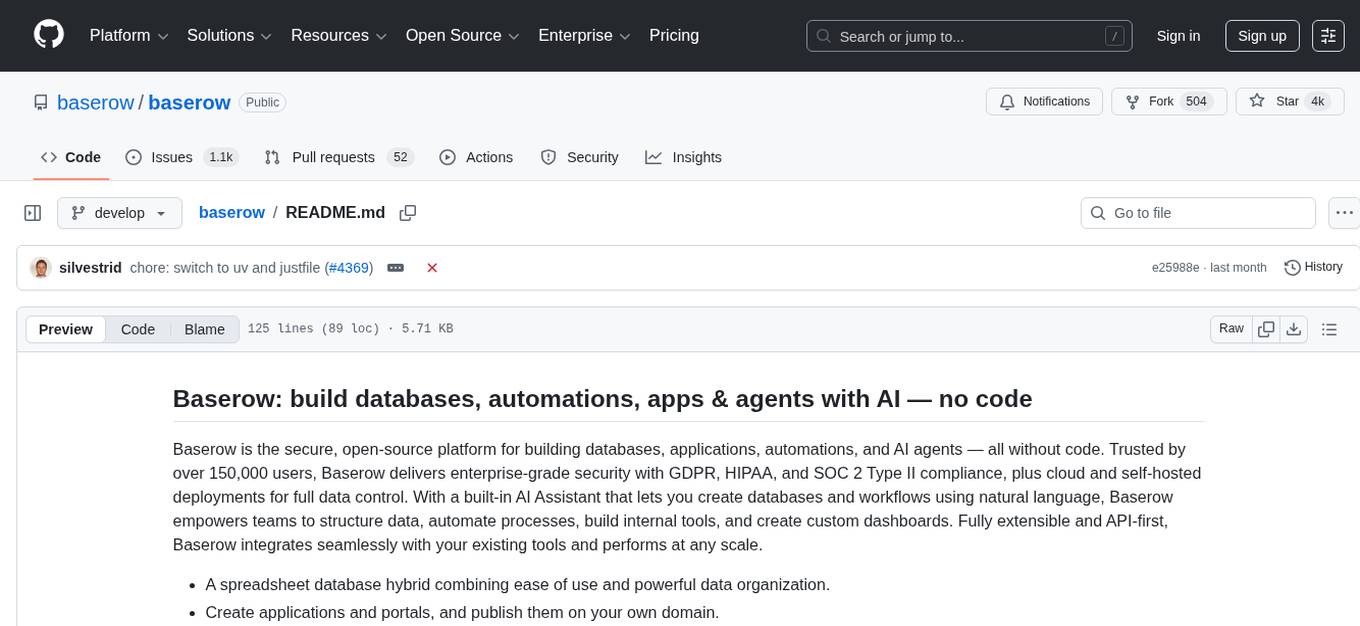
baserow
Baserow is a secure, open-source platform that allows users to build databases, applications, automations, and AI agents without writing any code. With enterprise-grade security compliance and both cloud and self-hosted deployment options, Baserow empowers teams to structure data, automate processes, create internal tools, and build custom dashboards. It features a spreadsheet database hybrid, AI Assistant for natural language database creation, GDPR, HIPAA, and SOC 2 Type II compliance, and seamless integration with existing tools. Baserow is API-first, extensible, and uses frameworks like Django, Vue.js, and PostgreSQL.
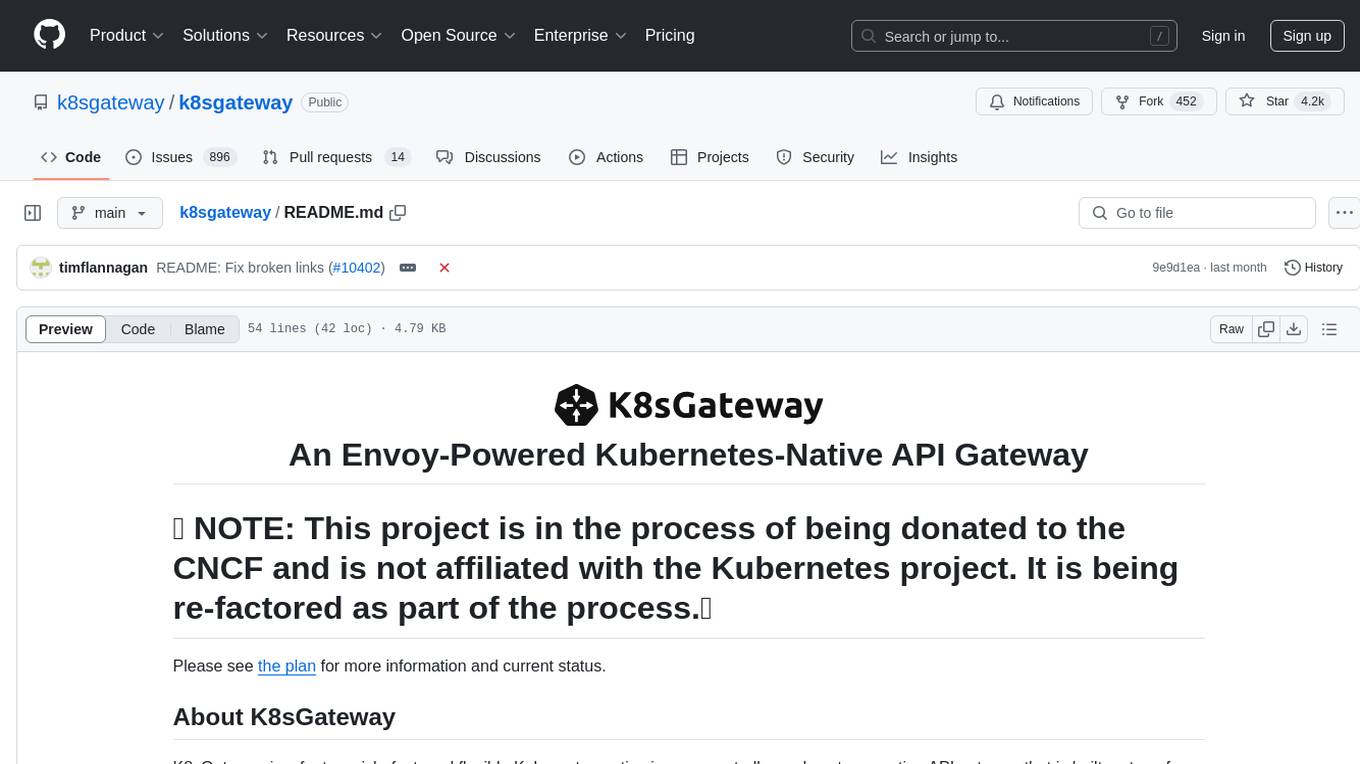
k8sgateway
K8sGateway is a feature-rich, fast, and flexible Kubernetes-native API gateway built on Envoy proxy and Kubernetes Gateway API. It excels in function-level routing, supports legacy apps, microservices, and serverless. It offers robust discovery capabilities, seamless integration with open-source projects, and supports hybrid applications with various technologies, architectures, protocols, and clouds.

mindsdb
MindsDB is a platform for customizing AI from enterprise data. You can create, serve, and fine-tune models in real-time from your database, vector store, and application data. MindsDB "enhances" SQL syntax with AI capabilities to make it accessible for developers worldwide. With MindsDB’s nearly 200 integrations, any developer can create AI customized for their purpose, faster and more securely. Their AI systems will constantly improve themselves — using companies’ own data, in real-time.
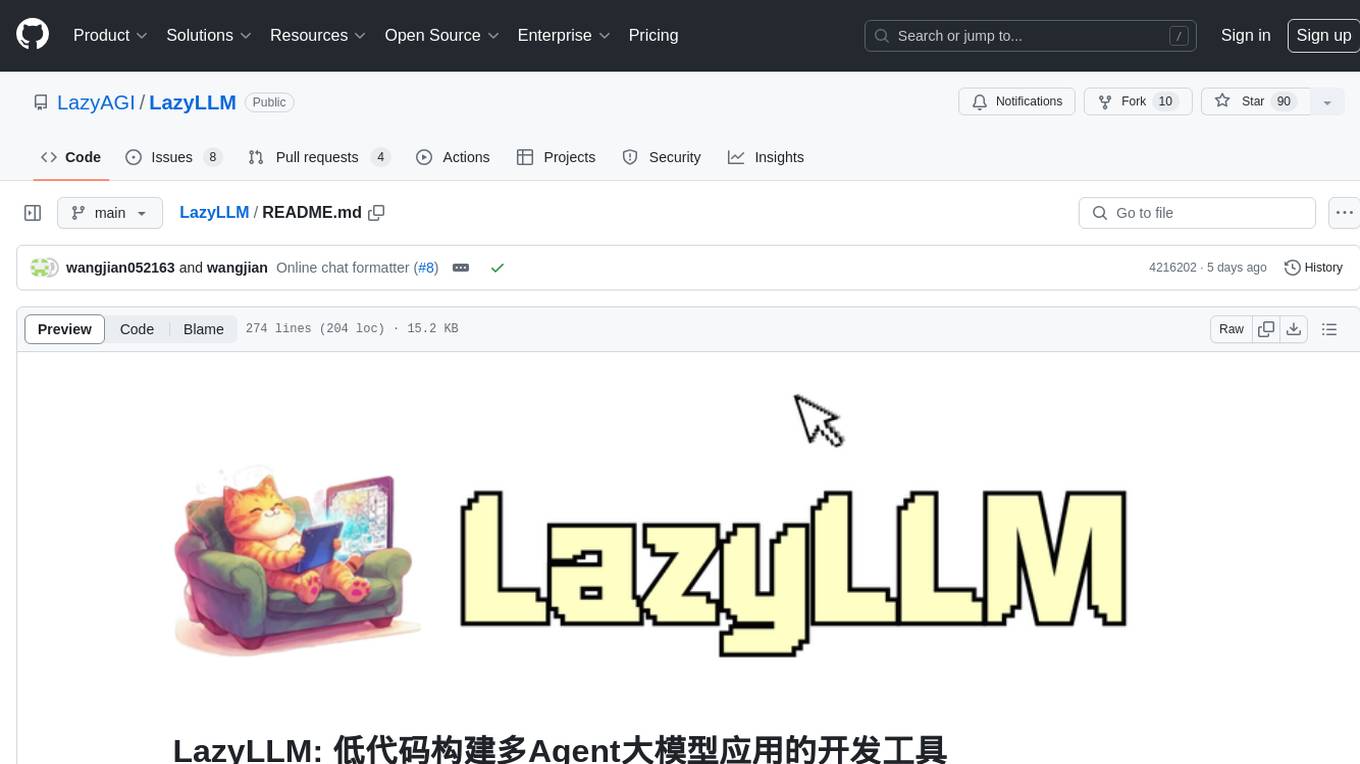
LazyLLM
LazyLLM is a low-code development tool for building complex AI applications with multiple agents. It assists developers in building AI applications at a low cost and continuously optimizing their performance. The tool provides a convenient workflow for application development and offers standard processes and tools for various stages of application development. Users can quickly prototype applications with LazyLLM, analyze bad cases with scenario task data, and iteratively optimize key components to enhance the overall application performance. LazyLLM aims to simplify the AI application development process and provide flexibility for both beginners and experts to create high-quality applications.
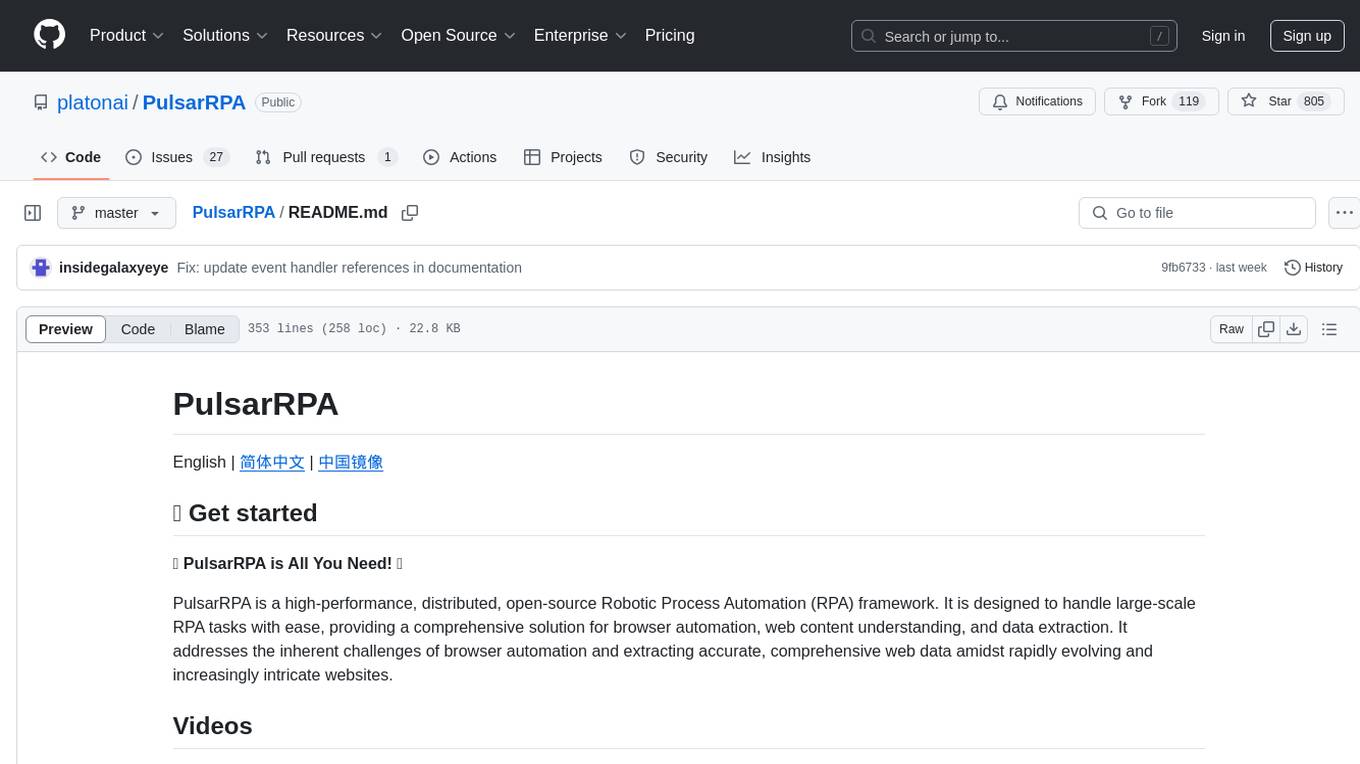
PulsarRPA
PulsarRPA is a high-performance, distributed, open-source Robotic Process Automation (RPA) framework designed to handle large-scale RPA tasks with ease. It provides a comprehensive solution for browser automation, web content understanding, and data extraction. PulsarRPA addresses challenges of browser automation and accurate web data extraction from complex and evolving websites. It incorporates innovative technologies like browser rendering, RPA, intelligent scraping, advanced DOM parsing, and distributed architecture to ensure efficient, accurate, and scalable web data extraction. The tool is open-source, customizable, and supports cutting-edge information extraction technology, making it a preferred solution for large-scale web data extraction.
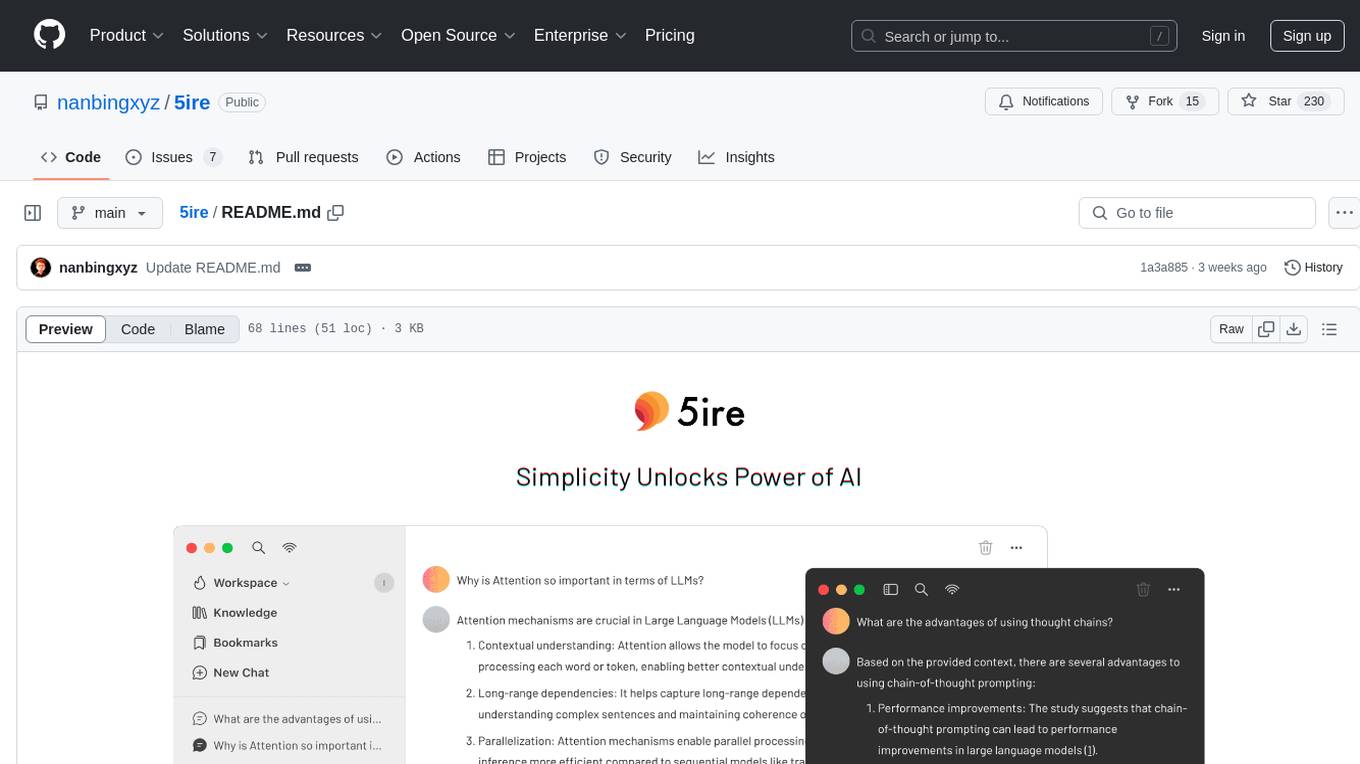
5ire
5ire is a cross-platform desktop client that integrates a local knowledge base for multilingual vectorization, supports parsing and vectorization of various document formats, offers usage analytics to track API spending, provides a prompts library for creating and organizing prompts with variable support, allows bookmarking of conversations, and enables quick keyword searches across conversations. It is licensed under the GNU General Public License version 3.
For similar tasks

CSGHub
CSGHub is an open source, trustworthy large model asset management platform that can assist users in governing the assets involved in the lifecycle of LLM and LLM applications (datasets, model files, codes, etc). With CSGHub, users can perform operations on LLM assets, including uploading, downloading, storing, verifying, and distributing, through Web interface, Git command line, or natural language Chatbot. Meanwhile, the platform provides microservice submodules and standardized OpenAPIs, which could be easily integrated with users' own systems. CSGHub is committed to bringing users an asset management platform that is natively designed for large models and can be deployed On-Premise for fully offline operation. CSGHub offers functionalities similar to a privatized Huggingface(on-premise Huggingface), managing LLM assets in a manner akin to how OpenStack Glance manages virtual machine images, Harbor manages container images, and Sonatype Nexus manages artifacts.
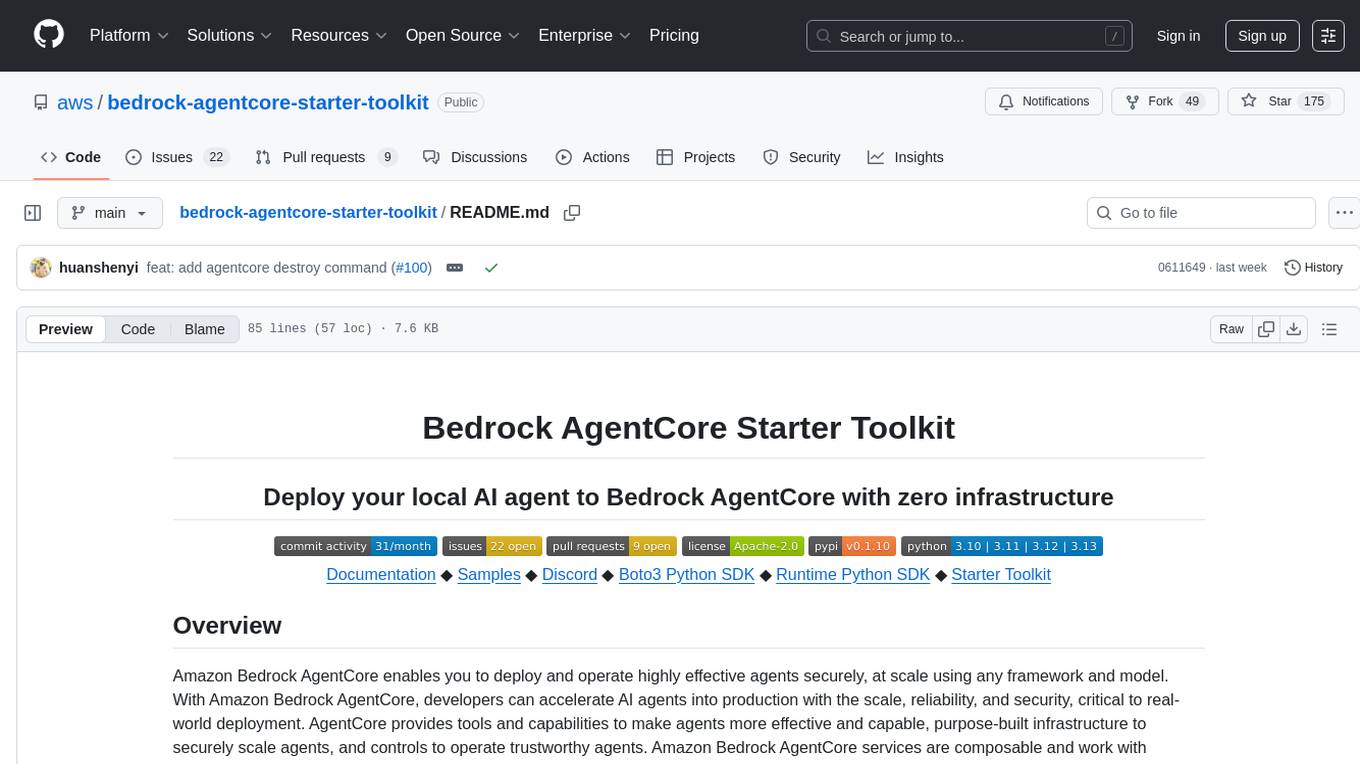
bedrock-agentcore-starter-toolkit
Amazon Bedrock AgentCore Starter Toolkit enables developers to deploy and operate highly effective AI agents securely at scale using any framework and model. It provides tools and capabilities to make agents more effective and capable, purpose-built infrastructure to securely scale agents, and controls to operate trustworthy agents. The toolkit includes modular services like Runtime, Memory, Gateway, Code Interpreter, Browser, Observability, Identity, and Import Agent for seamless migration of existing agents. It is currently in public preview and offers enterprise-grade security and reliability for accelerating AI agent development.
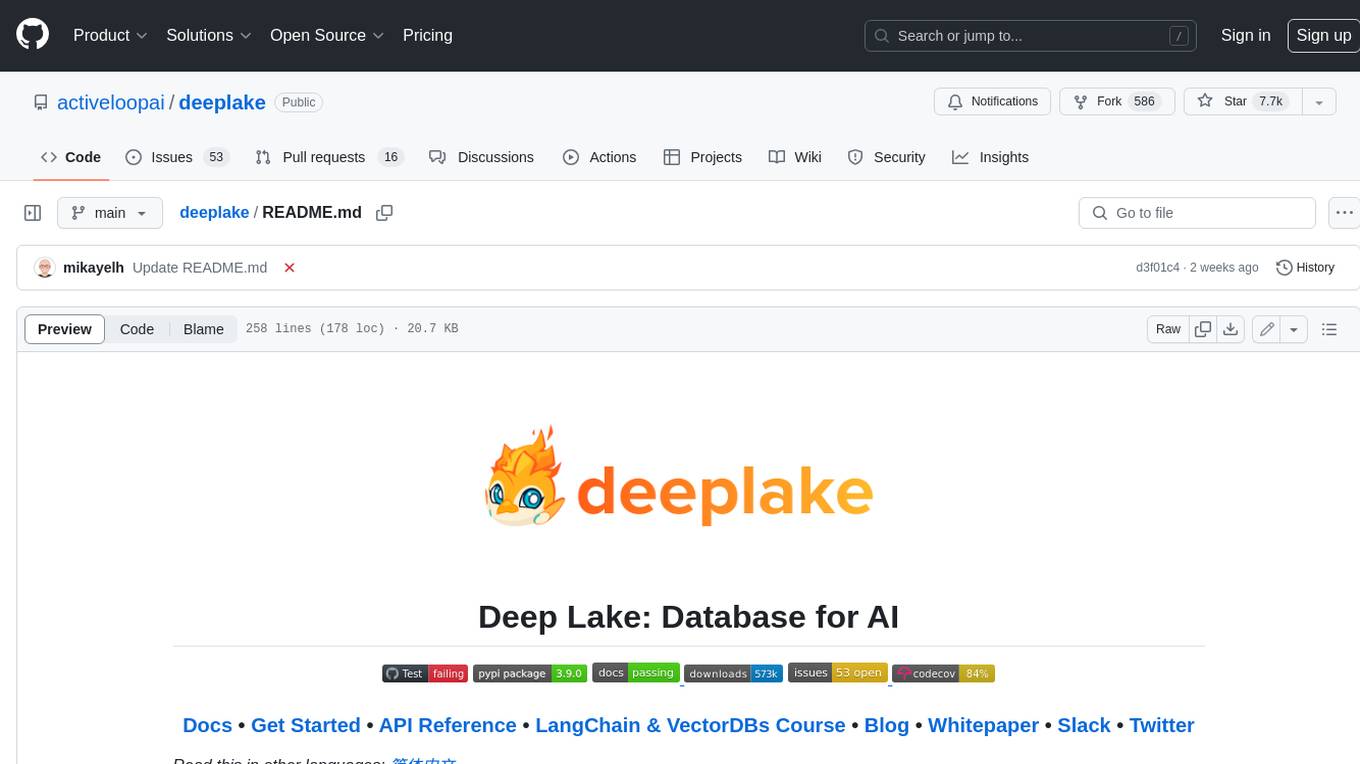
deeplake
Deep Lake is a Database for AI powered by a storage format optimized for deep-learning applications. Deep Lake can be used for: 1. Storing data and vectors while building LLM applications 2. Managing datasets while training deep learning models Deep Lake simplifies the deployment of enterprise-grade LLM-based products by offering storage for all data types (embeddings, audio, text, videos, images, pdfs, annotations, etc.), querying and vector search, data streaming while training models at scale, data versioning and lineage, and integrations with popular tools such as LangChain, LlamaIndex, Weights & Biases, and many more. Deep Lake works with data of any size, it is serverless, and it enables you to store all of your data in your own cloud and in one place. Deep Lake is used by Intel, Bayer Radiology, Matterport, ZERO Systems, Red Cross, Yale, & Oxford.
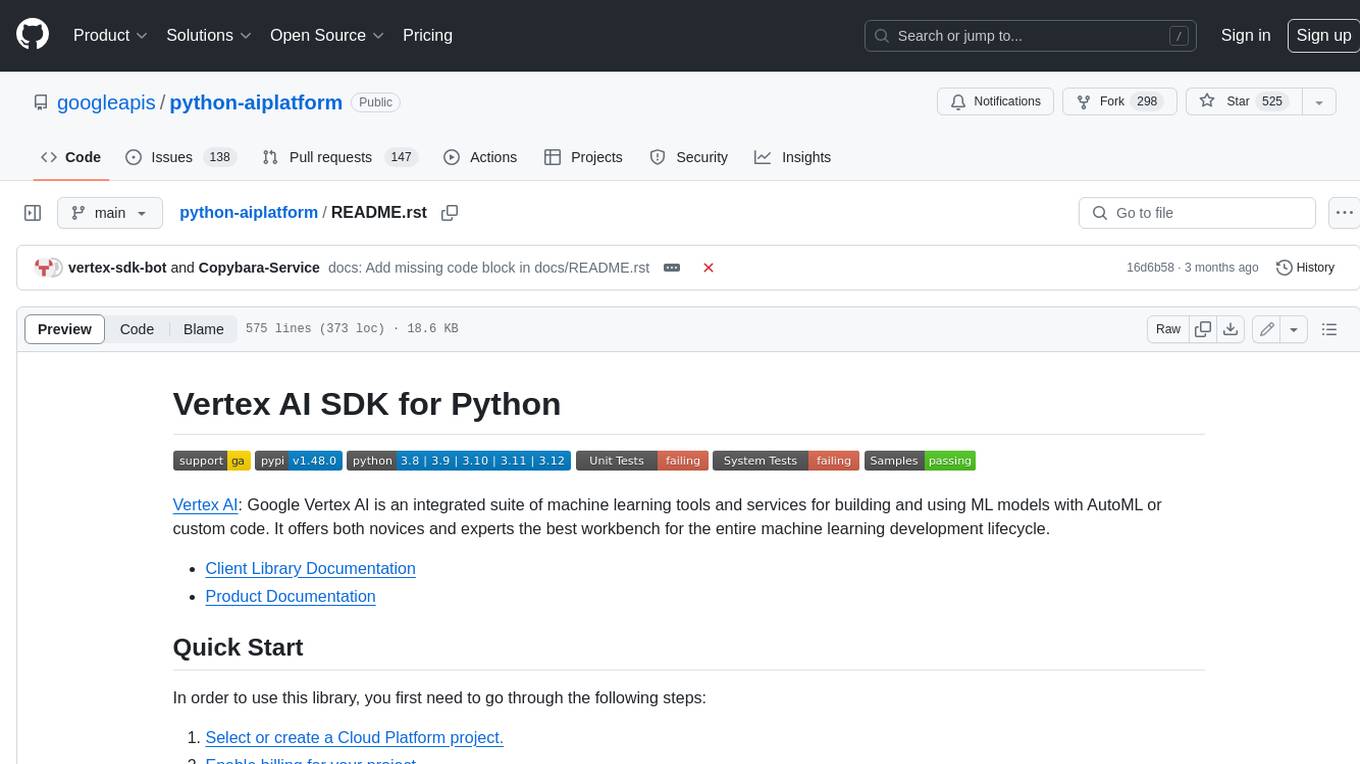
python-aiplatform
The Vertex AI SDK for Python is a library that provides a convenient way to use the Vertex AI API. It offers a high-level interface for creating and managing Vertex AI resources, such as datasets, models, and endpoints. The SDK also provides support for training and deploying custom models, as well as using AutoML models. With the Vertex AI SDK for Python, you can quickly and easily build and deploy machine learning models on Vertex AI.

fluid
Fluid is an open source Kubernetes-native Distributed Dataset Orchestrator and Accelerator for data-intensive applications, such as big data and AI applications. It implements dataset abstraction, scalable cache runtime, automated data operations, elasticity and scheduling, and is runtime platform agnostic. Key concepts include Dataset and Runtime. Prerequisites include Kubernetes version > 1.16, Golang 1.18+, and Helm 3. The tool offers features like accelerating remote file accessing, machine learning, accelerating PVC, preloading dataset, and on-the-fly dataset cache scaling. Contributions are welcomed, and the project is under the Apache 2.0 license with a vendor-neutral approach.
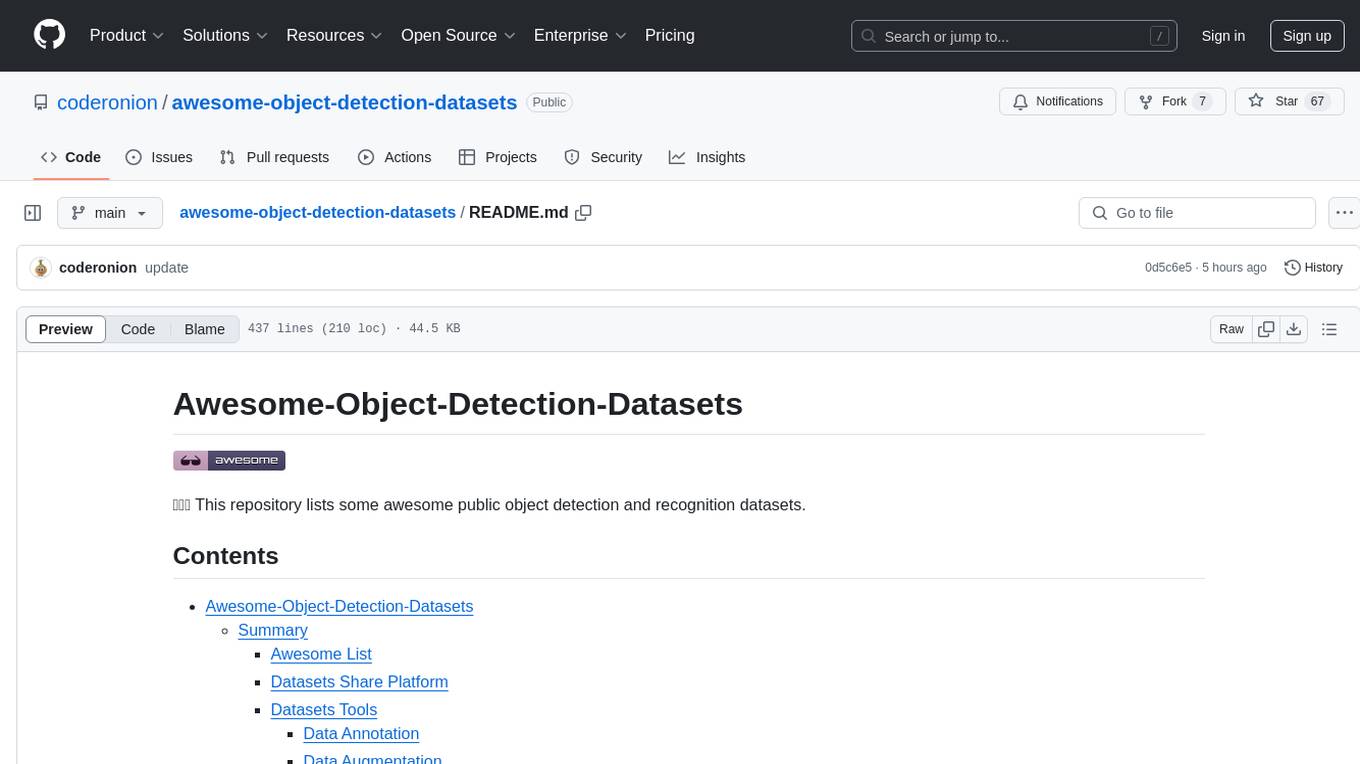
awesome-object-detection-datasets
This repository is a curated list of awesome public object detection and recognition datasets. It includes a wide range of datasets related to object detection and recognition tasks, such as general detection and recognition datasets, autonomous driving datasets, adverse weather datasets, person detection datasets, anti-UAV datasets, optical aerial imagery datasets, low-light image datasets, infrared image datasets, SAR image datasets, multispectral image datasets, 3D object detection datasets, vehicle-to-everything field datasets, super-resolution field datasets, and face detection and recognition datasets. The repository also provides information on tools for data annotation, data augmentation, and data management related to object detection tasks.
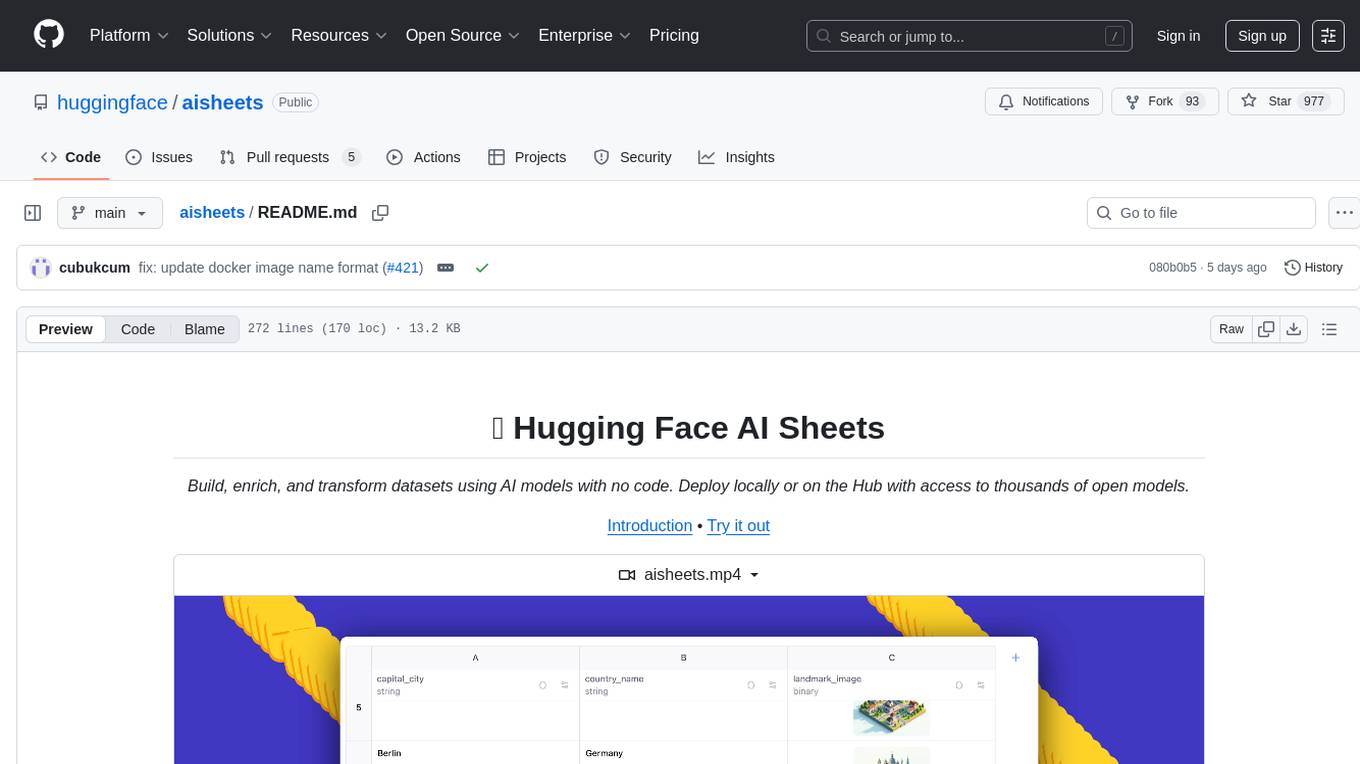
aisheets
Hugging Face AI Sheets is an open-source tool for building, enriching, and transforming datasets using AI models with no code. It can be deployed locally or on the Hub, providing access to thousands of open models. Users can easily generate datasets, run data generation scripts, and customize inference endpoints for text generation. The tool supports custom LLMs and offers advanced configuration options for authentication, inference, and miscellaneous settings. With AI Sheets, users can leverage the power of AI models without writing any code, making dataset management and transformation efficient and accessible.
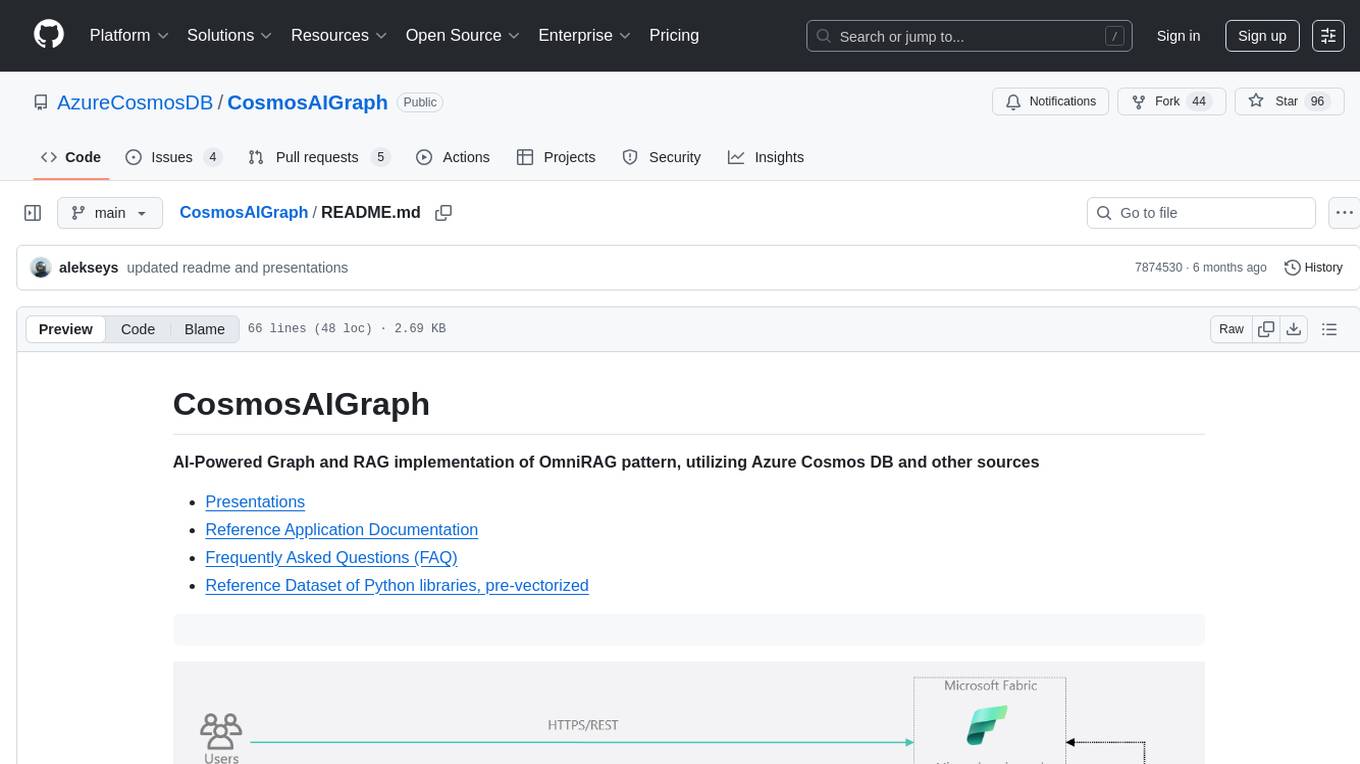
CosmosAIGraph
CosmosAIGraph is an AI-powered graph and RAG implementation of OmniRAG pattern, utilizing Azure Cosmos DB and other sources. It includes presentations, reference application documentation, FAQs, and a reference dataset of Python libraries pre-vectorized. The project focuses on Azure Cosmos DB for NoSQL and Apache Jena implementation for the in-memory RDF graph. It provides DockerHub images, with plans to add RBAC and Microsoft Entra ID/AAD authentication support, update AI model to gpt-4.5, and offer generic graph examples with a graph generation solution.
For similar jobs

weave
Weave is a toolkit for developing Generative AI applications, built by Weights & Biases. With Weave, you can log and debug language model inputs, outputs, and traces; build rigorous, apples-to-apples evaluations for language model use cases; and organize all the information generated across the LLM workflow, from experimentation to evaluations to production. Weave aims to bring rigor, best-practices, and composability to the inherently experimental process of developing Generative AI software, without introducing cognitive overhead.

LLMStack
LLMStack is a no-code platform for building generative AI agents, workflows, and chatbots. It allows users to connect their own data, internal tools, and GPT-powered models without any coding experience. LLMStack can be deployed to the cloud or on-premise and can be accessed via HTTP API or triggered from Slack or Discord.

VisionCraft
The VisionCraft API is a free API for using over 100 different AI models. From images to sound.

kaito
Kaito is an operator that automates the AI/ML inference model deployment in a Kubernetes cluster. It manages large model files using container images, avoids tuning deployment parameters to fit GPU hardware by providing preset configurations, auto-provisions GPU nodes based on model requirements, and hosts large model images in the public Microsoft Container Registry (MCR) if the license allows. Using Kaito, the workflow of onboarding large AI inference models in Kubernetes is largely simplified.

PyRIT
PyRIT is an open access automation framework designed to empower security professionals and ML engineers to red team foundation models and their applications. It automates AI Red Teaming tasks to allow operators to focus on more complicated and time-consuming tasks and can also identify security harms such as misuse (e.g., malware generation, jailbreaking), and privacy harms (e.g., identity theft). The goal is to allow researchers to have a baseline of how well their model and entire inference pipeline is doing against different harm categories and to be able to compare that baseline to future iterations of their model. This allows them to have empirical data on how well their model is doing today, and detect any degradation of performance based on future improvements.

tabby
Tabby is a self-hosted AI coding assistant, offering an open-source and on-premises alternative to GitHub Copilot. It boasts several key features: * Self-contained, with no need for a DBMS or cloud service. * OpenAPI interface, easy to integrate with existing infrastructure (e.g Cloud IDE). * Supports consumer-grade GPUs.

spear
SPEAR (Simulator for Photorealistic Embodied AI Research) is a powerful tool for training embodied agents. It features 300 unique virtual indoor environments with 2,566 unique rooms and 17,234 unique objects that can be manipulated individually. Each environment is designed by a professional artist and features detailed geometry, photorealistic materials, and a unique floor plan and object layout. SPEAR is implemented as Unreal Engine assets and provides an OpenAI Gym interface for interacting with the environments via Python.

Magick
Magick is a groundbreaking visual AIDE (Artificial Intelligence Development Environment) for no-code data pipelines and multimodal agents. Magick can connect to other services and comes with nodes and templates well-suited for intelligent agents, chatbots, complex reasoning systems and realistic characters.




